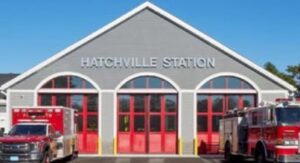
Cyanobacteria in Peters Pond, Sandwich in August of 2021.
HYANNIS – Public health officials have criticized the state for its proposed changes to Title Five, claiming the new rules would impact the emotional and financial well-being of residents.
The Massachusetts Association of Health Boards sent a letter to the Massachusetts Department of Environmental Protection stating MassDEP failed to incorporate public health analysis when making the new rules.
The letter outlined how the changes would impact homeowners if they had to make costly upgrades to innovative/alternative septic systems that could cost over $30,000 per household.
MAHB said those expenses would mean residents would have to divert funds away from things like housing, food, and utilities.
Policy Director Mike Hugo said one group that would be particularly impacted in the region are older populations living on fixed incomes.
“From a public health perspective, we’re concerned with the potential for a very vulnerable population to just not make it,” Hugo said.
The letter adds “the assumption that individual homeowners will be minimally impacted because they can attain interest free financing is as inhumane as it is shortsighted.”
Massachusetts introduced the changes to address the declining health of its embayments, much of that damage has been attributed to nitrogen from septic systems.
The letter from the MAHB also rebuked MassDEP for the changes not outlining any support for local health departments that would have to enforce the new rules.
“The agency is foisting a program upon local boards without any consideration for the actual, real-life, foreseeable hardships that this proposed regulation will bring to local boards.”
Hugo said the state’s Department of Public Health (DPH) received $200 million in federal pandemic relief funds, with $70 million earmarked for a program that would allow communities to share public health resources.
However, Hugo said that some towns have not utilized the money.
“There are boards that right now have not adopted the grant program and are still not taking advantage of those funds, which will bring additional Title Five inspectors and Title Five resources,” Hugo said.
He said the four towns on Cape Cod that have not applied to be part of the grant are Barnstable, Bourne, Falmouth, and Yarmouth.
Additionally, the MAHB letter says that MassDEP never reached out to MAHB as part of its stakeholder group for Title 5 and groundwater discharge, despite the fact that the association is listed as one of its members.
“We cannot locate any correspondence where we were informed of such inclusion and have no record of our participation to this point,” the MAHB letter said.
Representatives from MassDEP did not provide comment on the matter in time before the article’s publication.
The Westford Board of Health was also listed as part of the stakeholder group. The town’s health director Rae Dick confirmed a former employee participated in the stakeholder group.
UPDATE February 1, 2023 – 9:50am: A MassDEP official said the MAHB was contacted back in 2017 to be part of the group. Someone with the association designated a Dighton Board of Health member to represent them in the stakeholder group. MassDEP said they couldn’t currently confirm if anyone from MAHB ever participated after that point.
The proposed Title Five regulations note that if towns apply for watershed permits, property-owners will not have to make the septic system upgrades. Applying for permits would likely lead to extensive sewer projects for communities.
Hugo said that the MAHB agreed with the state that action needs to be taken to address water quality issues.
Many communities have pushed back against the proposed rules. Falmouth officials said the changes would mean serious implications for the town since it has 14 impacted estuaries, the most of any town on the Cape.
Dartmouth is potentially planning to take legal action against the state.
The period for public comment on the regulations ended Monday, January 30.
By Brian Engles, CapeCod.com NewsCenter
























